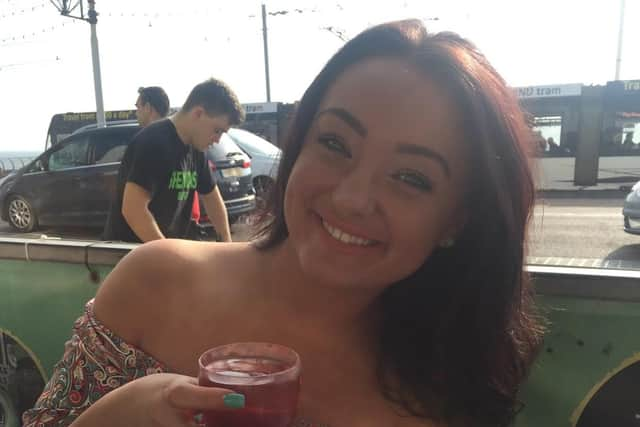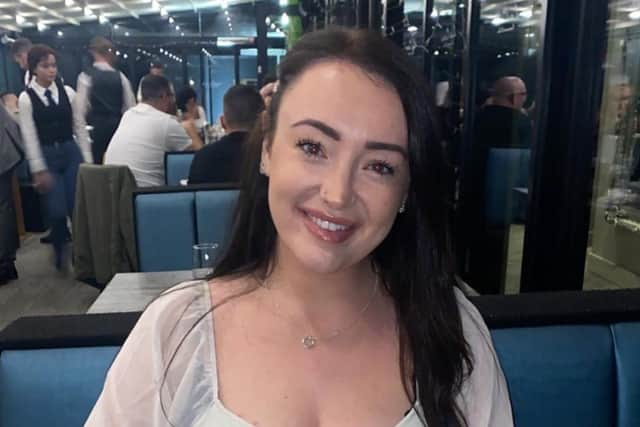Wigan borough mum speaks out after having a stroke when she was just 20
and live on Freeview channel 276
Louise Grimes, from Atherton, had a stroke in 2016 – but it was not diagnosed for three days.
She was working as a legal secretary at the time and had plans to become a solicitor and move to Ireland, where her parents had relocated.
Advertisement
Hide AdAdvertisement
Hide AdBut the day after she flew home from a trip to Ireland, she started to feel unwell.


Louise, now 27, said: “I woke up in the morning and felt really ill, almost like I had a severe hangover. I vomited a couple of times.
"I went to my friend’s house that day for tea. I sat at the table and the whole room started spinning. I was so dizzy. My co-ordination went. I went into her back garden and vomited.
"I never in a million years thought it would be true – that I felt like I was having a stroke.”
Advertisement
Hide AdAdvertisement
Hide Ad

The next morning Louise woke to find she could not feel the toes on her left foot, so she went to see her GP, who said she must have had a reaction to something and sent her home.
She said: “That night, I genuinely thought I was going to die. I had the most severe pain in my head. I felt like my head was going to explode.
"I remember trying to get down the stairs and I was crashing into the walls. I managed to get back upstairs and I don’t really remember what happened after that. I must have passed out on the bed and my sister called an ambulance.”
But she claims the paramedics that arrived were “dismissive” and did not take her to hospital, despite her not being able to speak, see or walk.
Advertisement
Hide AdAdvertisement
Hide AdHer sister called 999 again and another ambulance attended, which did take her to hospital.
There, she was initially misdiagnosed as having an ear infection, until an MRI scan three days later confirmed she had a stroke.
Louise said: “I feel like because I was so young, I wasn’t taken seriously at all.”
Louise was in Wigan Infirmary for three weeks, where she received physiotherapy.
Advertisement
Hide AdAdvertisement
Hide AdDoctors determined the stroke was caused by a hole in her heart, which she did not know was there, and she has since had surgery on it.
Louise said: “I felt so embarrassed and I didn’t want anybody to see me. I was only 20. It’s weird because it was not my fault at all, but I just felt so embarrassed about what happened and I didn’t know whether I would ever get back to normal. I just wanted to hide away from the world.
“At first, all I did was sleep. I was so exhausted. I used to go for a little walk with my mum up the road on my crutches. After three months, I felt like I’d recovered enough that I wanted to come back to my life in Wigan. I was desperate for my life to be normal again.”
But life was not the same for Louise. She used to love nights out with friends, but she now struggles to go to large events and did not go ahead with the move to Ireland.
Advertisement
Hide AdAdvertisement
Hide AdShe said: “Before my stroke I had a very active social life. I was always out with my friends. I was always out and about doing things. I would see my friends but after my stroke I couldn’t, and I still can’t, stand being in crowds of people. My co-ordination and balance have never been the same and I do still suffer with fatigue.. so I’ve never got that part of my social life back.”
However, Louise now has a happy family life with a two-year-old son and newborn daughter, and she has built a career in housing with the local authority.
She said: “Having a family is a massive thing for me. When I had my stroke, I didn’t even know if I’d be able to walk again. I completely changed my career, I feel really positive now and feel like I’ve got my ambition back. I feel so lucky and blessed that I have recovered well because I know a lot of people don’t.”
Louise has spoken out ahead of World Stroke Day on Sunday as she wants more people, including medical professionals, to understand that stroke can happen to younger people.
Advertisement
Hide AdAdvertisement
Hide AdShe said: “Until you’ve been through it, or you know someone who has had a stroke, people don’t really know anything about stroke, as well as the lasting effects of it.
“To young stroke survivors – things can get better. You’ve got to keep going and stay strong. When you go through something like that it can be really easy to just give up, but don’t give up hope.”
Over half (60 per cent) of the UK population believe that strokes do not happen to young adults, according to new research revealed by the Stroke Association.
Worryingly, a quarter of stroke survivors aged 60 and under (25 per cent) told the Stroke Association they had initially been diagnosed with another illness or condition, before being diagnosed with a stroke.
Advertisement
Hide AdAdvertisement
Hide AdAlexis Kolodziej, executive director at the Stroke Association, said: “Our research highlights that people still think stroke is a condition that only affects older people. It’s crucial that we challenge this misconception and make people aware that stroke affects young adults too.
“Stroke simply shouldn’t be a key milestone in a young adult’s life. When planning for the future, no-one prepares to have a stroke. Yet one in four strokes happen in people of working age and around 400 children have a stroke in the UK every year.”